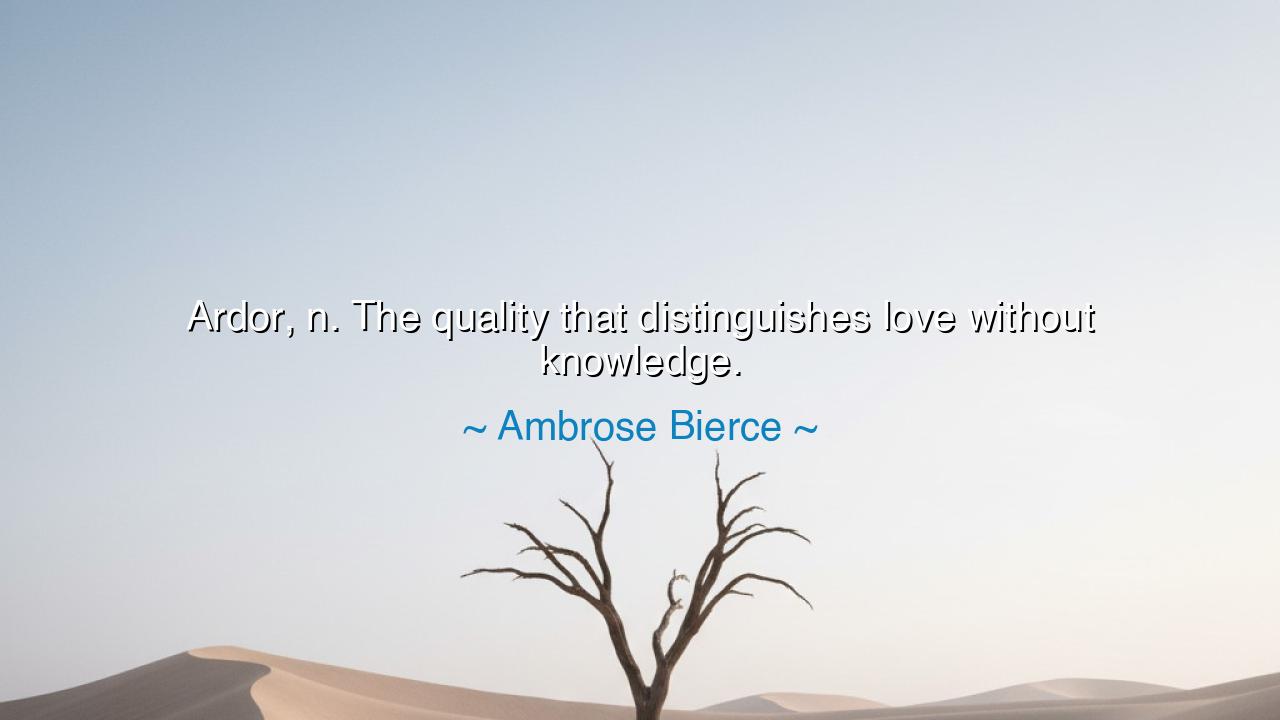
Ardor, n. The quality that distinguishes love without knowledge.






The sharp-tongued sage of irony, Ambrose Bierce, once wrote in his Devil’s Dictionary: “Ardor, n. The quality that distinguishes love without knowledge.” In these few words, he reveals both the fire and the folly of human passion. For ardor is that burning enthusiasm, that urgent longing, that fierce desire which seizes the heart before the mind has had time to see clearly. It is the first spark of love, but not yet the steady flame of understanding.
To love without knowledge is to be swept away by appearance, by fancy, by the intoxication of the unknown. It is the youth’s love, wild and unquestioning, that clings to the image of another without yet knowing their depths, their flaws, or their truth. Such ardor is bright, but it is also dangerous: it can lift one into ecstasy, but it can also lead into ruin. Bierce, with his dark wit, warns us that this fiery passion is not yet the full measure of love—it is the imitation, the shadow, the first stage that may wither if not deepened by wisdom.
History gives us many lessons in this truth. Consider the tale of Antony and Cleopatra. Their ardor for one another burned with a brilliance that shook the world. Yet it was a love without knowledge—or rather, without balance, without foresight. Their passion blinded them to the needs of their kingdoms, to the strategies of Rome, to the consequences of surrendering judgment to desire. And so, though their story is immortal, their end was tragic, proving Bierce’s irony: ardor dazzles, but when it is not joined with wisdom, it devours.
Yet we must not despise ardor, for it is also the beginning of great journeys. Without it, love would never take root, dreams would never ignite, causes would never be embraced. It is ardor that stirs the artist to create without knowing the audience, the reformer to fight without knowing the outcome, the youth to love without knowing the hardships of commitment. Though it lacks knowledge, it carries courage. Though it is blind, it gives motion to the soul.
The lesson is that ardor must be tempered, not extinguished. Passion must ripen into understanding, enthusiasm must be grounded in truth, and love without knowledge must grow into love with wisdom. Only then does fire become warmth instead of destruction. Just as iron must pass through flame before becoming a strong blade, so must love pass through ardor before becoming enduring affection.
In your own life, honor the gift of ardor but do not be enslaved by it. When passion seizes you—whether for a person, a calling, or a dream—let it inspire you to act, but seek also to learn, to understand, to see clearly. Do not confuse the first rush of desire for the fullness of truth. Instead, let knowledge refine your love, until what began in fire may endure as light.
Thus, Bierce’s irony hides a deeper wisdom: “Ardor… the quality that distinguishes love without knowledge.” It is a warning against foolishness, but also a recognition of the human heart’s first impulse toward greatness. Let us, then, cherish ardor as the beginning, but strive for something greater—the union of passion and knowledge, the marriage of heart and mind. For in that union lies not only the thrill of desire, but the strength of love that endures the ages.






AAdministratorAdministrator
Welcome, honored guests. Please leave a comment, we will respond soon